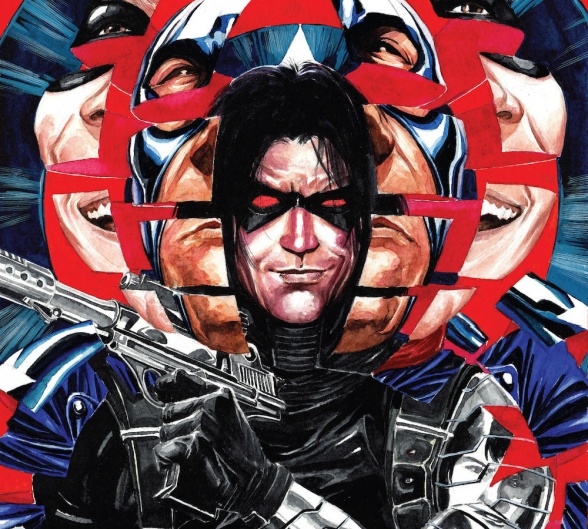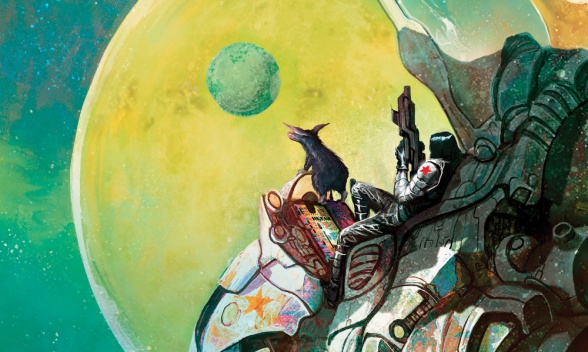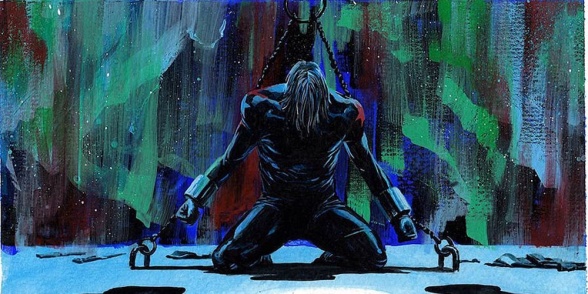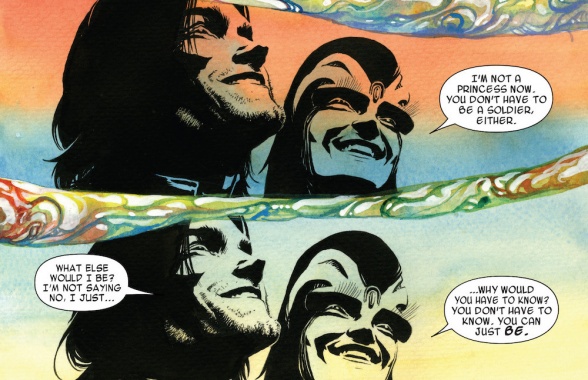Bucky Barnes has never known peace. He fought alongside Captain America in World War 2, a child soldier paraded as a sidekick and mascot. He spent most of his life as a brainwashed Soviet assassin, thawed out of cyro-sleep when someone needed to be killed. He eventually took up the mantle of Captain America before once again becoming a super-spy (but this time he’s a good guy). He’s been fighting non-stop since he was old enough to shave.
During Marvel’s 2014 event, “Original Sin,” Nick Fury revealed himself to be Earth’s “Man on the Wall” – the first and last line of defence figure protecting the planet from intergalactic invasion, and going through some extreme and highly unethical lengths to do so. He’s the invisible monster who keeps the other monsters at bay. Original Sin ends with Fury becoming the Unseen, a silent observer and replacement for Earth’s Watcher Uatu. Needing a new Man on the Wall, Bucky Barnes was entrusted with the title of Earth’s hidden protector.
This is where Ales Kot, Marco Rudy and Langdon Foss’s “Bucky Barnes: The Winter Soldier” starts off: with the eponymous character joined by Nick Fury protégée and ex-S.H.I.E.L.D. director Daisy Johnson. The series only ran for a short 11-issues; readers expecting super-spy space adventures were given an existential meditation on humanity and peace instead.

As the Man on the Wall, Fury did some horrible, horrible things. He tortured and killed people, burned worlds, destabilised galaxies and dethroned gods. It brings up the age-old question of do the ends justify the means? Can Fury’s actions be justified if it means stopping the Earth from being destroyed?
So what does it say about Bucky that he’s the most suitable candidate to take up position? Is he best suited to become the Man On The Wall because he’s willing to keep the earth safe, no matter the cost?

Bucky has a long history of having other people’s titles thrust upon him. He was brainwashed into becoming the Winter Soldier, and his memories were regularly wiped. It wasn’t his choice – it was forced upon him. The title of “Winter Soldier” was given to him, and it’s a name that carries the worst of his baggage. It’s a constant reminder of all the terrible things he did as KGB agent. Even the title of Captain America, which while passed onto him, isn’t his own name. He’s just filling someone else’s shoes. Now he’s the Man on the Wall, yet again filling taking up someone else’s title (like Fury did before him). It’s a title he’s taken on begrudgingly, telling Daisy, “I’m not entirely happy about being put in this situation—but someone’s got to do it.”
Bucky is a chameleon able to blend and change to fit into his surroundings as seem fit (he is a superspy, after all). That fluid persona is what Kot is mainly concerned with exploring in “Winter Soldier”. He asks whether or not Bucky Barnes can just be Bucky Barnes, and not something else. Discussing the series with the AV Club, Kot noted that, “Shedding the old and embracing the new is the core of the character and the series.”

The first issue of “The Winter Soldier” opens with Bucky’s internal monologue: “The thing about war? I hear it never ends.” Bucky is a soldier, a killer. That’s all he’s ever done, and that’s all he’s ever known. That history is what Kot wants to deconstruct. If you’re entire life is defined by fighting and war, what does that say about you? If the only thing you know how to do is be a weapon are you capable of being human? When does the hand holding the gun stop being another weapon?
The series kicks off with when Bucky and Daisy are given their next mission: assassinate Ventolin Xtal, queen of the planet Mer-Z-Bow and the Pao’ree race – who are all telepathically interconnected pacifists. Instead of killing her Bucky instantly falls in love; something he didn’t think was possible. It throws his world into an existential crisis, making him question just who he really is: “I thought I was a killer. Now, I don’t know.”
Continued below
This is where “Winter Soldier” shifts. We’re introduced to a much older version of Bucky, hailing from an alternate universe. There, Old Bucky has hung up his weapons, achieving peace. There is no more war or fighting in this universe, with the widespread peace coming through acceptance and cooperation, instead of conflict.
Old Bucky’s universe is also home to an alternate version of Crossbones, who exists as the Barnes’s shadow. An intergalactic war takes the life of Crossbone’s father and his home planet away from him at a young age. His lust for revenge twists him, setting him down a path of continued violence. It consumes him, leading him to kill all the heroes of his universe, leaving Bucky as the only survivor. He believes that chaos is the natural state of the universe, that hate and everything that emotion creates is an unbreakable cycle. He lives in his destroyed childhood home, unable to move on from his past and let his wounds heal. “Life is hate. All is war.”
Old Bucky and Crossbones play a 70-year long game of cat and mouse, constantly chipping away at one another. It’s an endless cycle of violence that neither is able to break. It’s the same cycle that led to Bucky becoming the Man on the Wall, continuing the cycle the same way Fury continued the cycle when he was given the title.
Crossbone’s late father tells his son that, “The appropriate response to reality is to take responsibility for your own story. Otherwise you just become a part of someone else’s.” Bucky spent a good portion of his life as just a part of someone else’s story, because he was constantly denied agency to make his own choice. But that’s where Bucky and Crossbones diverge. Bucky breaks the cycle of violence and war thanks to Ventolin. She’s shows him that he’s able to love – that he isn’t just a cold, heartless killer. She lets him just be Bucky. And if a gun can stop being a gun, why can’t that happen universe wide?

During a montage detailing his ongoing fight against Crossbones, Old Bucky reflects on their seemingly never-ending and never changing war:
“We were toys in someone’s backyard, fighting again and again for no other reason but to satisfy our deranged masters, children with their sandboxes and imaginations on a loop that supplied nothing but violence.”
Kot is commenting on how rigid the canon of superhero comics is, and how character development is frequently to satiate the needs of fans and creators. His attempt to make Bucky grow is admirable, but unfortunately futile in the long run. The status quo for Marvel and DC Comics is like a rubber band; you stretch it out from its original form all you like, but eventually it’s going to snap back into place.
“Bucky Barnes: The Winter Soldier” is one of the most underrated Marvel books of recent years, and is possibly the best character study of the title character. In the end it was unable to escape the event horizon of Marvel’s status quo – but for one brief moment, Bucky Barnes stopped killing and was finally able to live.




